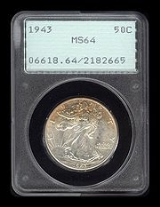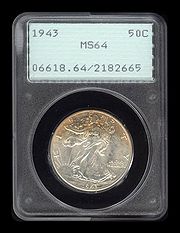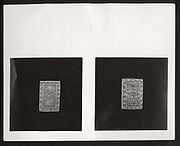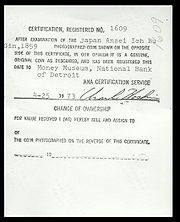
Third Party Grading
Encyclopedia
Third Party Grading is a term used to refer to coin grading
, authentication
, and encapsulation companies. Often abbreviated TPG, these companies will, for a fee, "slab" a coin
. Some companies offer a guarantee covering the grade or authenticity of the coin.


 As of 2008, there were four prevalent coin grading services: PCGS, NGC, ANACS, and ICG. There are subtle variations in the grades assigned by each of these major services, and prospective buyers are encouraged to seek professional or expert advice before making any important rare coin purchases.
As of 2008, there were four prevalent coin grading services: PCGS, NGC, ANACS, and ICG. There are subtle variations in the grades assigned by each of these major services, and prospective buyers are encouraged to seek professional or expert advice before making any important rare coin purchases.
Third Party Grading was pioneered by ANACS, which was founded by the American Numismatic Association
(ANA) in 1972. The board of governors realized the need to have a guarantee of authenticity, and so offered the first authentication service. At that time, the coins were not graded, only confirmed as genuine. Encapsulation had not yet come about, either, and so the coins were returned with a photo certificate.
In 1986 Professional Coin Grading Service
(PCGS)http://pcgs.com/ opened, pioneering encapsulation with a plastic slab now known as the Old Green Holder, or rattler, because of its color and the way coins would sometimes rattle inside. PCGS was followed by Numismatic Guaranty Corporation
(NGC)http://www.NGCcoin.com/ in 1987. , there are four prevalent coin grading services, which include PCGS, ICG, NGC, and ANACS. There are subtle variations in the grades assigned by each of these major services, and prospective buyers are encouraged to seek professional or expert advice before making any important rare coin purchase.
An interesting contender among grading services was Compugrade. They sought (ultimately unsuccessfully) to remove the human from the loop, and have a computer grade their coins. It is uncertain whether this technology was ever successfully employed. Ultimately people decided that computers weren't very consistent in their grading of coins and they lost favor.
In the May 26, 2003 edition of Coin World, the hobby newspaper had announced they had contracted investigators to conduct a year-long, comparative study of PCGS, ACCGS.org, and NGC, along with several other grading services, each known as a Third Party Grader or TPG. In their investigation, Coin World sent several of the same coins were sent to each grading service over the course of a year, each coin being graded by all Third Party Graders sent to. The findings were; "In no case did the grading services agree on the grade of any given coin, and in some cases the difference in grading was as much as seven points off". By way of example, a finding published by Coin World involved one case where ACCGS had graded a coin as "cleaned", which lowers the coin value, Additionally the coin had been graded several grades lower than PCGS while PCGS had not noted the same coin was "in fact, cleaned". It is standard in U.S. numismatics to grade coins on a point-scale from 1 (poor) to 70 (perfect)and to note if a coin has been cleaned or poorly mishandled, or in some cases, to reject it for encapsulation.
On January 5, 2007, the Professional Numismatists Guild PNG published a more recent report PNG Report into grading services and standards. The survey indicated the professional opinions of numismatists who buy and sell coins. No grading service was listed as "outstanding". PCGS and NGC were ranked as "superior". ANACS and ICG were ranked as "good".
In September 2004, members of the American Numismatic Association (ANA) reported seeing counterfeit NGC and PCGS holders (also known as "slabs") at the Long Beach
Coin Show. Members of the Beverly Hills Coin Club (BHCC), an affiliate club-member of the ANA, had reported counterfeit coin slabs as early as December 3, 1998. As a direct result, BHCC partnered with ACCGS, manned by unpaid club volunteers, as a pre-certification service for coins and to "guarantee the authenticity of slabs or Third Party Grader holders". More counterfeit PCGS and NGC holders were reported on eBay
in 2005 and later years, but NCG did not address the problem until 2008, after high-quality counterfeit holders had been seen and purchased on eBay. NGC published the following acknowledgment on January 7, 2008:
NGC and PCGS counterfeit holders have been reported in eBay forums and more may be reported by other firms and individuals. The PCGS website notes that they "anticipate that authentic coins will eventually be placed into counterfeit holders". Third party graders are taking measures to resist counterfeiting, however, counterfeit holders may multiply and improve over time. Numismatic Guaranty Corporation and PCGS offer no reimbursement liability for the prices paid for coins in their counterfeit holders. Both firms have online links to verify the holder numbers. However, many buyers may not be computer users or may be unaware of such links. Caution is advised when purchasing coins in PCGS and NGC holders as the seller can disclaim liability due to the "third party" nature of the counterfeit holder. Additionally, it may be too late to request refunds from eBay sellers before holders can be verified as counterfeits. Many coins are posted on eBay and through other venues "as is" and therefore with no return privileges.
Until recently, third party graders in Canada were using only a soft slab for coin certification services. CCCS (Canadian Coin Certification Service)is the first and only Canadian certification company to introduce hard casements for certified coins.
CCCS now offers two separate types of holders to encase certified cons: soft or hard. Soft slabs are made of inert mylar and are sealed with the additional security of a company hotstamp logo applied to the holder prior to assembly. Hard holders are made of museum quality acrylic and are sealed with a sonic welder. The casements, as well as the insert rings, are inert and UVA/UVB protected.
Currency notes are sealed in an inert mylar envelope with perforations that allow the note to breathe for better preservation.
CCCS was founded in 2004 by Louis Chevrier, and is located in St-Basile-le-Grand, Quebec. The company is well recognized as a leading Canadian grading service and is recognized for it’s accuracy, consistency, and security.
Coin grading
In coin collecting coin grading is the process of determining the grade or condition of a coin, one of the key factors in determining its value as a collector's item....
, authentication
Authentication
Authentication is the act of confirming the truth of an attribute of a datum or entity...
, and encapsulation companies. Often abbreviated TPG, these companies will, for a fee, "slab" a coin
Coin
A coin is a piece of hard material that is standardized in weight, is produced in large quantities in order to facilitate trade, and primarily can be used as a legal tender token for commerce in the designated country, region, or territory....
. Some companies offer a guarantee covering the grade or authenticity of the coin.

History


Third Party Grading was pioneered by ANACS, which was founded by the American Numismatic Association
American Numismatic Association
The American Numismatic Association was founded in 1891 by Dr. George F. Heath in Chicago, Illinois. The ANA was formed to advance the knowledge of numismatics along educational, historical and scientific lines, as well as enhance interest in the hobby.The ANA national headquarters and museum is...
(ANA) in 1972. The board of governors realized the need to have a guarantee of authenticity, and so offered the first authentication service. At that time, the coins were not graded, only confirmed as genuine. Encapsulation had not yet come about, either, and so the coins were returned with a photo certificate.
In 1986 Professional Coin Grading Service
Professional Coin Grading Service
PCGS is the acronym for Professional Coin Grading Service a third party grading service for grading rare coins. Founded in 1986, and located in Newport Beach, CA., it is a subsidiary of Collector's Universe, Inc. , a company that also buys and sells rare coins and operates a rare comic book...
(PCGS)http://pcgs.com/ opened, pioneering encapsulation with a plastic slab now known as the Old Green Holder, or rattler, because of its color and the way coins would sometimes rattle inside. PCGS was followed by Numismatic Guaranty Corporation
Numismatic Guaranty Corporation
The Numismatic Guaranty Corporation is a provider of third-party coin grading services to numismatists. The company was founded in 1987 and is headquartered in Sarasota, Florida...
(NGC)http://www.NGCcoin.com/ in 1987. , there are four prevalent coin grading services, which include PCGS, ICG, NGC, and ANACS. There are subtle variations in the grades assigned by each of these major services, and prospective buyers are encouraged to seek professional or expert advice before making any important rare coin purchase.
An interesting contender among grading services was Compugrade. They sought (ultimately unsuccessfully) to remove the human from the loop, and have a computer grade their coins. It is uncertain whether this technology was ever successfully employed. Ultimately people decided that computers weren't very consistent in their grading of coins and they lost favor.
In the May 26, 2003 edition of Coin World, the hobby newspaper had announced they had contracted investigators to conduct a year-long, comparative study of PCGS, ACCGS.org, and NGC, along with several other grading services, each known as a Third Party Grader or TPG. In their investigation, Coin World sent several of the same coins were sent to each grading service over the course of a year, each coin being graded by all Third Party Graders sent to. The findings were; "In no case did the grading services agree on the grade of any given coin, and in some cases the difference in grading was as much as seven points off". By way of example, a finding published by Coin World involved one case where ACCGS had graded a coin as "cleaned", which lowers the coin value, Additionally the coin had been graded several grades lower than PCGS while PCGS had not noted the same coin was "in fact, cleaned". It is standard in U.S. numismatics to grade coins on a point-scale from 1 (poor) to 70 (perfect)and to note if a coin has been cleaned or poorly mishandled, or in some cases, to reject it for encapsulation.
On January 5, 2007, the Professional Numismatists Guild PNG published a more recent report PNG Report into grading services and standards. The survey indicated the professional opinions of numismatists who buy and sell coins. No grading service was listed as "outstanding". PCGS and NGC were ranked as "superior". ANACS and ICG were ranked as "good".
In September 2004, members of the American Numismatic Association (ANA) reported seeing counterfeit NGC and PCGS holders (also known as "slabs") at the Long Beach
Long Beach, California
Long Beach is a city situated in Los Angeles County in Southern California, on the Pacific coast of the United States. The city is the 36th-largest city in the nation and the seventh-largest in California. As of 2010, its population was 462,257...
Coin Show. Members of the Beverly Hills Coin Club (BHCC), an affiliate club-member of the ANA, had reported counterfeit coin slabs as early as December 3, 1998. As a direct result, BHCC partnered with ACCGS, manned by unpaid club volunteers, as a pre-certification service for coins and to "guarantee the authenticity of slabs or Third Party Grader holders". More counterfeit PCGS and NGC holders were reported on eBay
EBay
eBay Inc. is an American internet consumer-to-consumer corporation that manages eBay.com, an online auction and shopping website in which people and businesses buy and sell a broad variety of goods and services worldwide...
in 2005 and later years, but NCG did not address the problem until 2008, after high-quality counterfeit holders had been seen and purchased on eBay. NGC published the following acknowledgment on January 7, 2008:
"NGC has identified and confirmed that (counterfeit replicas) of its holder has been produced.......The holder has been seen housing counterfeit dollar or foreign crown size coins. While the enclosed coins are also counterfeit, the label information matches the coin type enclosed. The label information is copied from actual NGC certification labels, and the certification information therefore will match the NGC database. Most frequently, Trade Dollars and Bust Dollars are found, although Flowing Hair Dollars and foreign coins have also been seen. A range of grades is also represented."
NGC and PCGS counterfeit holders have been reported in eBay forums and more may be reported by other firms and individuals. The PCGS website notes that they "anticipate that authentic coins will eventually be placed into counterfeit holders". Third party graders are taking measures to resist counterfeiting, however, counterfeit holders may multiply and improve over time. Numismatic Guaranty Corporation and PCGS offer no reimbursement liability for the prices paid for coins in their counterfeit holders. Both firms have online links to verify the holder numbers. However, many buyers may not be computer users or may be unaware of such links. Caution is advised when purchasing coins in PCGS and NGC holders as the seller can disclaim liability due to the "third party" nature of the counterfeit holder. Additionally, it may be too late to request refunds from eBay sellers before holders can be verified as counterfeits. Many coins are posted on eBay and through other venues "as is" and therefore with no return privileges.
Until recently, third party graders in Canada were using only a soft slab for coin certification services. CCCS (Canadian Coin Certification Service)is the first and only Canadian certification company to introduce hard casements for certified coins.
CCCS now offers two separate types of holders to encase certified cons: soft or hard. Soft slabs are made of inert mylar and are sealed with the additional security of a company hotstamp logo applied to the holder prior to assembly. Hard holders are made of museum quality acrylic and are sealed with a sonic welder. The casements, as well as the insert rings, are inert and UVA/UVB protected.
Currency notes are sealed in an inert mylar envelope with perforations that allow the note to breathe for better preservation.
CCCS was founded in 2004 by Louis Chevrier, and is located in St-Basile-le-Grand, Quebec. The company is well recognized as a leading Canadian grading service and is recognized for it’s accuracy, consistency, and security.

